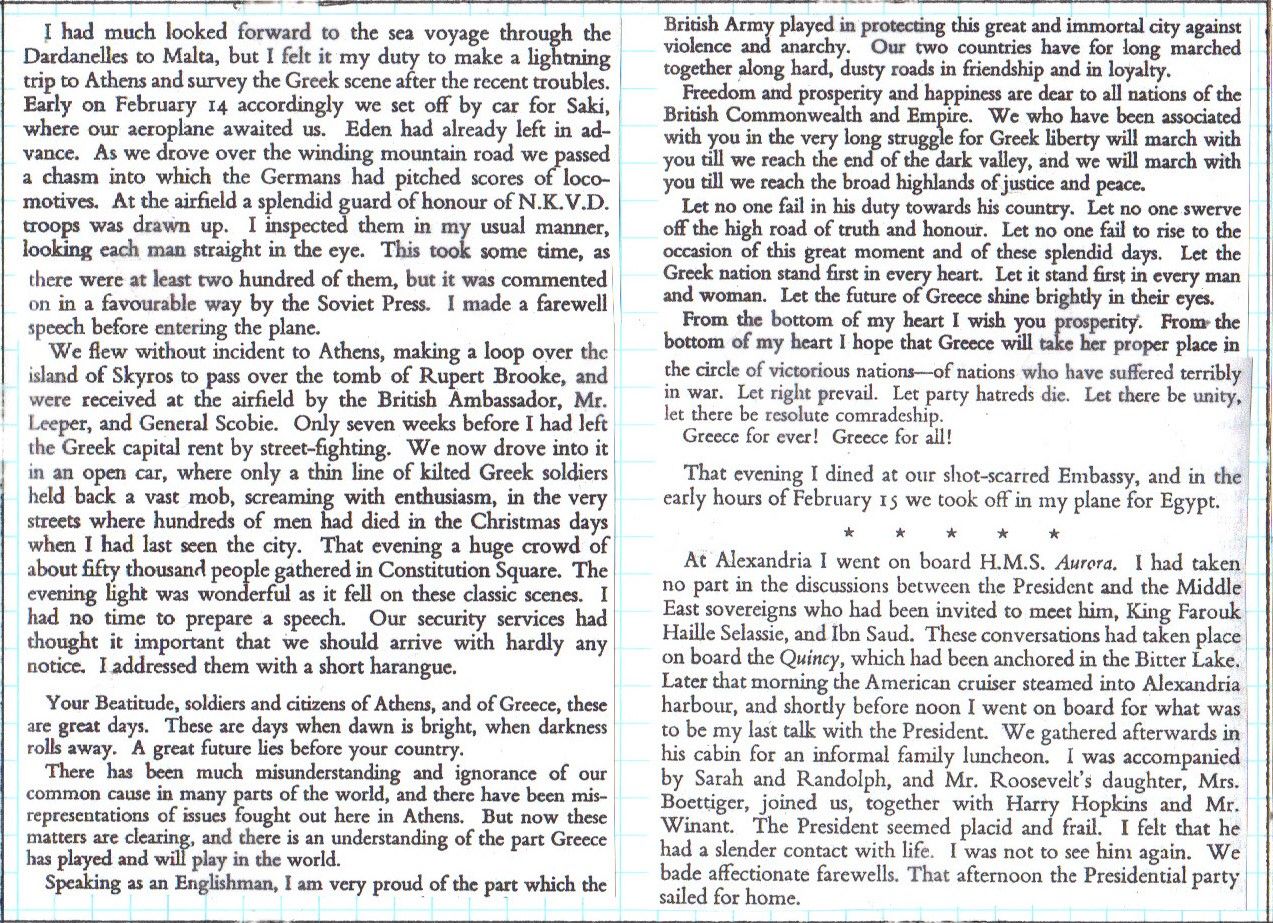
Winston S. Churchill, Triumph and Tragedy
381st BG diary entry: Flying as “B” group in the Combat Wing, which led the entire First Air Division, we turned what might have been a miserable and costly failure into one of our outstanding combat performances Feb. 14.
Dresden was briefed as the target center, but the field order carried a strict injunction that nothing whatsoever would interrupt the bomber stream, heading for a target very close to the advancing Russians in southern Germany. Consequently, when the Group ahead of us led off course because of a foul cloud and contrail conditions over the central Reich, Capt. Tyson, 535th operations officer up as Group leader for our 37 bomber contingent, realized the time schedule had already been upset. He therefore had no other choice but to seek a target of opportunity.
While we peeled off in search of such an objective, after sustaining considerable damage from AA defenses, the Group ahead went plowing on through the cumulo-bango weather and flak prevailing over Munster. Capt. Pelenik, Group lead bombardier for the day, began looking for a hot target through weather that constantly varied between VACU and fubar. Although he was unaware of the full importance of what he finally selected at the time, he lined up on a vast industrial pile which later proved to be the long-sought-after SudetenländischeTreibstoffwerke, an A-plus priority synthetic oil plant two miles northwest of Brux, Czechoslovakia.
There, as strike photos later proved, lead and high squadrons did an excellent visual job, with heavy and tight bomb concentrations placed in and near the plant buildings.
The 12-plane low squadron, failing to recognize Palenik’s bomb run, made up for the oversight a few minutes later when they hammered home their explosives on the Skoda arms plant at Pilsen.
It was a rough day, with the formations encountering moderate to intense flak, first at Munster, next at Brux and finally at Pilsen. On the way out, the crews observed our excellent escort in large dogfights with the Luftwaffe although none of our formations were attacked.
Eighteen of our aircraft landed away from base, thirteen of them on the Continent, most of them for lack of fuel or because of engine failures. Two crews bailed out of their aircraft over Belgium and, of these, two were injured – 2nd Lt. E. B. Wulf and S/Sgt. C.J. Kubiak, pilot and tail gunner respectively, who were hospitalized in Belgium. Four drifted into enemy lines and presumably were made prisoners.
Missing in action are: Sgts. D. McCartney, radio; W. Tresti, ball turret; P.D. Boland, waist; and M.P. Bioavert, tail, all of the 534th.
It was rough back at the base after the remnants of the formation came in, too. The rest of the day was spent in trying to determine what it was the Fortresses hit. Grave fears were expressed that the formation was over Chemnitz at the bombs away and that the explosives had fallen on the Russians. When the target had been identified, however, there was great rejoicing. For it developed that the bombs had fallen on an objective which the Eighth had been seeking for months.
The most unusual experience of the mission belonged to 2nd Lt. Hugh D. Robinson, Jr., Wulf’s co-pilot. Having bailed out of his Fortress, Robinson was picked up just inside the Allied lines by American soldiers. Examined by a doctor, he was ordered to the hospital at Leige for X-rays. He went off in an L5, was clouded in while in the air, flew around until the fuel gave out, and then bailed for the second time. That wasn’t all. He was in a B-24, for a ride back to England, when the Liberator’s landing gear collapsed while it was taxing for take-off.
“...I felt it my duty to make a lightning trip to Athens...”
“At the airfield a splendid guard of honour of N.K.V.D. troops was drawn up. I inspected them in my usual manner, looking each man straight in the eye. This took some time, as there were at least two hundred of them...”
I love Churchill! He is making a “lightning trip” but takes the time to look each of 200 Soviet men in the eye because he was once in their shoes an knew the effort it took to get turned out for such an occasion for a “big wig” (unlike life-long political operative Stalin or Barry).
Churchill also noted that they flew to Athens, “making a loop over the island of Skyros to pass over the “tomb of Rupert Brooke,”.
Huh, When Winston wrote this in 1953 in Triumph and Tragedy, folks might have had a clue who Brooke was and why he was buried in Skyros Greece.
We of cousre have to go to wiki for answers. Rupert Chawner Brooke (3 August 1887 – 23 April 1915) was an English poet known for his idealistic war sonnets written during the First World War, especially “The Soldier”.
Brooke’s accomplished poetry gained many enthusiasts and followers and he was taken up by Edward Marsh who brought him to the attention of Winston Churchill, then First Lord of the Admiralty. He was commissioned into the Royal Naval Volunteer Reserve as a temporary Sub-Lieutenant shortly after his 27th birthday and took part in the Royal Naval Division’s Antwerp expedition in October 1914. He sailed with the British Mediterranean Expeditionary Force on 28 February 1915 but developed sepsis from an infected mosquito bite. He died at 4:46 pm on 23 April 1915 in a French hospital ship moored in a bay off the island of Skyros in the Aegean on his way to the landing at Gallipoli. As the expeditionary force had orders to depart immediately, he was buried at 11 pm in an olive grove on Skyros, Greece.